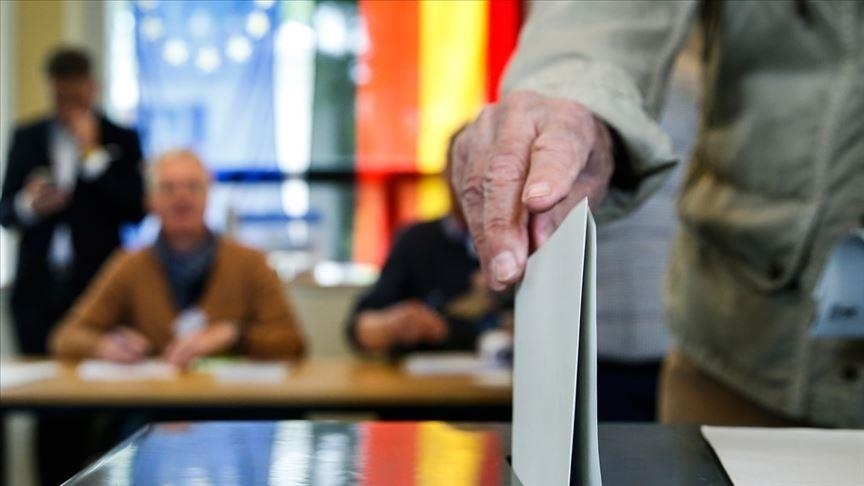Germany elections: Far-right AfD surging as center-right loses protest votes, says pollster
AfD has almost doubled its support since 2021 because of voter dissatisfaction with Scholz’s coalition government, says Manfred Guellner, head of the Forsa polling institute

- Unpopularity of chancellor frontrunner Merz, particularly among women and young people, has made it difficult for the CDU/CSU to woo disillusioned voters, according to expert
- If all small parties enter parliament, Merz’s CDU/CSU will need a more complex three-party coalition, potentially creating political instability that the AfD could exploit, says Guellner
BERLIN
Germany’s far-right Alternative for Germany (AfD) is gaining support as center-right parties have failed to capture protest votes, a senior polling expert has told Anadolu ahead of Sunday’s elections.
Manfred Guellner, head of the Forsa polling institute, said many Germans were dissatisfied with Chancellor Olaf Scholz’s collapsed three-party coalition, but the main opposition Christian Democrats (CDU/CSU) failed to win over these voters.
“Christian Democratic Union (CDU) leader Friedrich Merz was unpopular even in the early days of his political activity, and this has not changed even to this day,” he said. “Merz is unpopular especially among female voters, young people, and also voters in East Germany.”

With just days to go, Merz’s Christian Democrats hold a clear lead of 27% in the latest polls, but this represents a sharp decline from the conservative alliance’s previous electoral showings – 41.5% in 2013, 41.4% in 1994, and 48.8% in 1983.
The far-right AfD, meanwhile, has almost doubled its tally since the previous election, from 10.3% in 2021 to approximately 20% in current polls.
According to Guellner, the AfD has attracted protest votes from those uncomfortable with the policies of Scholz’s coalition government – commonly known as the “traffic light coalition” due to the party colors of its members: the Social Democratic Party (SPD), the Greens, and the liberal Free Democratic Party (FDP).
The AfD has now become the first far-right party in Germany’s post-WWII history to gain such broad public support, as past surveys show that right-wing extremist views were never supported by more than 10% of German voters.
“The AfD's vote share now surpasses that of any previous right-wing radical movement – groups that have existed continuously in the Federal Republic since the collapse of National Socialism,” Guellner said, referring to the collapse of Adolf Hitler’s Nazi regime in 1945.
“The AfD has not only won over these right-wing radical voters, but has also benefited from dissatisfaction with Chancellor Scholz’s traffic light coalition. Those unhappy with this coalition have turned to the AfD rather than the main opposition Christian Democrats,” he explained.
Scholz’s coalition fell apart in November after escalating disagreements over government spending and borrowing plans.
Its three-year term generated widespread public discontent, struggling to address rising energy prices, increased living costs, migration challenges, and broader socioeconomic issues.
AfD protest voters ‘beginning to embrace extremist views’
Guellner said the number of undecided voters remains unusually high this time compared to previous pre-election surveys.
He attributed this partly to the unpopularity of both chancellor candidates – frontrunner Merz and the incumbent Scholz.
While the AfD has largely benefited from public discontent, the expert highlighted a concerning trend: many who initially supported the AfD as protest voters are now beginning to embrace the party’s extremist views.
“The main core of AfD voters are those who have always been susceptible to a right-wing extremist world view, for xenophobia and ethnic-nationalist ideas, and the others have started to support the AfD out of protest,” he explained.
“But they also adopt the AfD way of thinking, and that is the danger. They are now not letting themselves change their mind in their decision to vote for the AfD,” he added.
In recent years, several prominent members of the AfD have sparked controversy with their anti-immigrant, xenophobic, and antisemitic remarks.
AfD leaders have repeatedly promoted their controversial “remigration” proposal – a vague term the party uses to describe mass deportations of immigrants from the country.
Critics accuse the party of stirring up fear of terrorism for political gain, spreading negative propaganda about immigrants, and encouraging anti-Muslim racism and Islamophobia in the country.
Fragmented results in AfD’s favor
After the elections, analysts expect Merz’s CDU/CSU alliance to seek a two-party coalition with either Scholz’s SPD or the Greens. However, if three small parties surpass the 5% parliamentary threshold, the CDU/CSU will need to form a three-member coalition instead, as mainstream parties would hold fewer seats.
According to the latest YouGov poll, the socialist Die Linke is set to enter parliament with 9%, while the left-populist BSW polled at 5%, barely clearing the threshold. The liberal FDP stands at 4%, falling short of parliamentary entry.
With support for the AfD rising and voters increasingly disillusioned with the center-right and center-left parties that have long governed Germany through coalitions, Guellner warned that a fragmented election result could delay the formation of a stable government.
This, he said, could lead to weeks of negotiations and political uncertainty, potentially increasing the far-right AfD’s support even further.
Despite the AfD’s significant rise in polls, the party remains politically isolated in the German political landscape. All mainstream parties have consistently refused to form coalitions or cooperate with the far-right party, citing its extremist positions and anti-democratic tendencies.
“If all the small parties get over 5% and enter the parliament – the FDP, the BSW (Sahra Wagenknecht Alliance), and Die Linke (The Left) – then there could be a situation of instability,” he warned.
“The formation of a two-party coalition government between the CDU/CSU and SPD might also be at risk, and that is a situation that the AfD could also exploit again if there is no stable new government.”
Anadolu Agency website contains only a portion of the news stories offered to subscribers in the AA News Broadcasting System (HAS), and in summarized form. Please contact us for subscription options.







